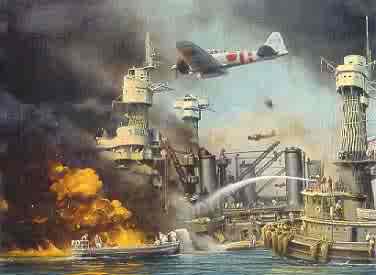|
restoring our biblical and constitutional foundations
|
Pearl Harbor and the Cycle of Fear
Now that the “date which will live in infamy” is upon us again, it’s as good a time as ever to read John Denson’s essay about the deceitful activity of U.S. presidents. Denson’s article is entitled FDR, Pearl Harbor and the U.N. Commenting on George Victor’s The Pearl Harbor Myth: Rethinking the Unthinkable, Denson writes:
Victor mentions that subsequent presidents to Roosevelt have also deceitfully taken America into wars but provides no names. He could have cited President Lyndon Johnson and his lies about the Gulf of Tonkin incident to get Congress to authorize him to retaliate to get America into the Viet Nam War. He could also have mentioned our current president and the lies about weapons of mass destruction to get us into the war with Iraq. In both cases Congress accepted the lies of the president and unconstitutionally delegated the war making power to the president rather than declaring war itself, as the Constitution requires.
If you haven’t already, you should start feeling déjà vu about Iran. Remember that the established elites of today must depend on mass apathy for their cause to succeed, just as they did prior to Pearl Harbor. It seems to me that America, like so many other nations in the distant past, is caught up in the fatal cycle of fear, armaments, and then warfare. We do evil in the hope that good might come of it. We think we can organize the world for peace and good will, but our optimism is a gross underestimate of the latent force of national hubris. Everyone knows that there is far more fear in the world than there was in 2001, far more belligerence, and a nationalistic selfishness more stupid and arrogant than ever. The truth is that war achieves nothing, and “preemption” gets us nowhere but into more war.
It is strange to think now how far we have come from the humble foreign policy enunciated by candidate Bush eight years ago. Instead of making the world safer for democracy, the only important thing appears to be the discovery of something that will keep the dream of empire alive. This is as true today as it was back in 1941. Pieter Friedrich reminds us that
[T]he Japanese tried time and again to negotiate with the United States, and the U.S. government rejected every offer the Japanese presented. The reason it seemed useless to the Japanese to continue diplomatic negotiations was because the U.S. was diplomatically frustrating every step the Japanese took.
 “Frustrating
every step the Japanese took” is probably an understatement. Yet this is
no excuse for an American public that allows itself to be lulled into war
time and time again. It is clear that the Iraq War has “taken it out” of
our generation, exhausting our capacity for emotional and moral reaction
to events. For over four years – longer than it took us to defeat Nazi
Germany in World War II – it has been a daily succession of knock-down
blows, hopes deferred or hopes defeated. Even in 2003 I could not see, for all my sympathy with the victims of
9-11, that it was the duty of the United States to take up arms against a
nation that had never attacked us. Like some stormy Elizabethan play, the
visionaries of empire forbid the curtain to fall on the tragic
circumstances of the Middle East. The play evolves into an eternal drama
that is draining the life-blood out of the nation.
“Frustrating
every step the Japanese took” is probably an understatement. Yet this is
no excuse for an American public that allows itself to be lulled into war
time and time again. It is clear that the Iraq War has “taken it out” of
our generation, exhausting our capacity for emotional and moral reaction
to events. For over four years – longer than it took us to defeat Nazi
Germany in World War II – it has been a daily succession of knock-down
blows, hopes deferred or hopes defeated. Even in 2003 I could not see, for all my sympathy with the victims of
9-11, that it was the duty of the United States to take up arms against a
nation that had never attacked us. Like some stormy Elizabethan play, the
visionaries of empire forbid the curtain to fall on the tragic
circumstances of the Middle East. The play evolves into an eternal drama
that is draining the life-blood out of the nation.
No one knows how much longer this situation can continue. All the devices of hampering, interfering, and restricting constitutional government – the cynical weapons of the neocon imperialists – are in use today just as they were in 1941. The ideological campaign to discredit Iran in the minds of the public goes on in the mainstream press and by means of every public medium of communication the state has at its disposal. Dissenters are made to feel the sinister weapons of government pressure. The legal machinery is already in hand, ready to be employed whenever the administration feels the time is ripe, for the elimination of even more of our constitutional liberties and for the restriction of public dissent.
We Americans do not like to look back. We are not interested in the past but the future. “Pearl Harbor was then, this is now!” Some content themselves in pottering about in gardens, others raise chickens, still others write letters to the newspapers about politics and philanthropies. There is, however, something salutary about an occasional backward glance, for we might have kept a straighter course as a nation had we more consistently applied the tragic lessons of the past.
December 7, 2007
David Alan Black is the editor of www.daveblackonline.com.